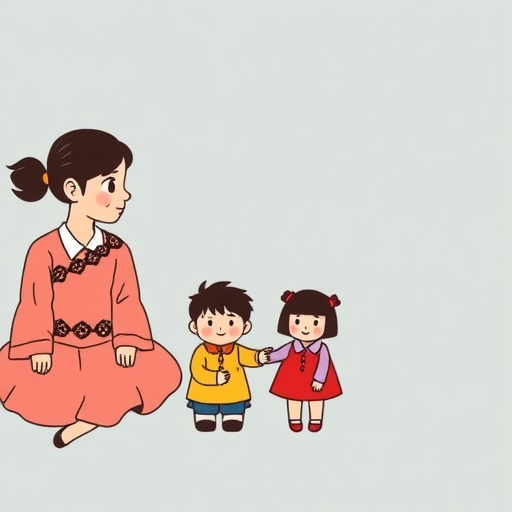Recent research delves into the intricate relationship between family resilience and adolescent mental health within the context of Chinese families. The study conducted by Yu, Zhou, and Shek has shed light on this crucial intersection, revealing how personal strengths can mediate the impact of familial dynamics on youth well-being. As mental health challenges among adolescents continue to escalate globally, understanding the role of family structures becomes increasingly vital.
Family resilience is defined as the ability of a family to respond positively to adversity, thereby fostering a supportive environment for its members during challenging times. In the studies conducted, it was evident that families possessing higher levels of resilience provide not only emotional support but also practical coping strategies that adolescents can adopt when facing stressors. Adolescents navigating their formative years encounter numerous challenges, from academic pressures to social expectations. In resilient families, the ability to manage these stressors effectively can serve as a protective factor against mental health issues.
This research underscores the importance of personal strengths in mediating the influence of family resilience on adolescent mental health. Personal strengths refer to the individual attributes and skills that empower an adolescent to cope effectively with challenges. These attributes could include emotional regulation, optimism, problem-solving skills, and strong interpersonal relationships. When adolescents develop and harness these strengths, they are better equipped to navigate the complexities of their environment.
Another compelling aspect of the study involves the cultural context surrounding Chinese families. The concept of family plays a central role in Chinese society, often dictating social norms and expectations. Traditional values emphasize collectivism, where family interests supersede individual desires. This cultural backdrop significantly influences how family resilience is manifested and perceived. The findings suggest that, in a collectivist culture like China, family resilience may serve as a cornerstone for nurturing personal strengths in adolescents.
Moreover, the researchers employed a robust methodology to gather data, utilizing both qualitative and quantitative approaches. Surveys and interviews were conducted with a diverse sample of families across several provinces in China. The combined data provided a comprehensive overview of the mechanisms by which family resilience fosters personal strengths, contributing to better adolescent mental health outcomes. By employing a mixed-methods approach, the researchers were able to highlight the nuanced experiences of families in varying socioeconomic conditions.
The results indicate that higher levels of family resilience correlate strongly with improved mental health in adolescents. This relationship is not merely linear; rather, it is complex and multifaceted. The study posits that personal strengths serve as a significant mediating factor in this dynamic. As adolescents cultivate these strengths, they become not only more resilient but also more capable of contributing back to their family unit, thereby creating a positive feedback loop.
Furthermore, the implications of these findings extend beyond the academic realm. Parents, educators, and mental health practitioners can derive valuable insights from this research. Interventions aimed at enhancing family resilience may include workshops, counseling sessions, and family activities that promote communication and mutual support. By focusing on building strong familial bonds, parents can effectively equip their children with the necessary tools to navigate life’s challenges.
The study also highlights the necessity for policy changes that support family-centered mental health initiatives. Governments and community organizations must recognize the significance of family dynamics in addressing adolescent mental health issues. Funding programs that foster family resilience, such as support groups and community engagement activities, could mitigate the rising rates of mental health disorders among youth.
As researchers continue to explore the depths of family resilience in relation to adolescent mental health, the call for further investigation remains pivotal. Future studies should consider longitudinal research designs to assess how changes in family resilience over time impact adolescent development. Additionally, comparative studies involving different cultural backgrounds could illuminate how varying familial structures affect mental health outcomes globally.
In summary, this research offers a crucial perspective on the interplay between family resilience and adolescent mental health within Chinese families. The mediating role of personal strengths reveals a pathway for enhancing well-being among youth. As society grapples with escalating mental health challenges, understanding and reinforcing family dynamics may serve as a cornerstone in promoting healthier future generations. Family resilience not only uplifts individual adolescents but potentially cultivates a more robust social fabric, capable of weathering the storms of life.
The findings advocate for collective responsibility—encouraging families, communities, and policy-makers to invest in resilience-oriented programs. As we unpack these insights, it becomes clear that fostering resilience within families can equip adolescents with the necessary skills and strengths to thrive in an increasingly complex world.
Too often, the conversation surrounding adolescent mental health concentrates solely on the individual. However, this research powerfully redirects our focus toward the family unit as a fundamental support system. By elevating discussions about family resilience and its profound implications, we pave the way towards a more holistic understanding of mental health, one that acknowledges the interconnectedness of personal and familial well-being.
In conclusion, as more families embrace the concept of resilience, we can anticipate a positive ripple effect on adolescent mental health. By nurturing personal strengths and reinforcing supportive family dynamics, families can contribute significantly to their children’s psychological resilience. The journey toward mental well-being for adolescents may begin at home, setting the stage for a healthier society in general.
Subject of Research: Family Resilience and Adolescent Mental Health in Chinese Families
Article Title: Family Resilience and Adolescent Mental Health in Chinese Families: The Mediating Role of Personal Strengths
Article References:
Yu, L., Zhou, X., Shek, D.T.L. et al. Family Resilience and Adolescent Mental Health in Chinese Families: The Mediating Role of Personal Strengths.
Applied Research Quality Life (2025). https://doi.org/10.1007/s11482-025-10453-x
Image Credits: AI Generated
DOI: 10.1007/s11482-025-10453-x
Keywords: Family resilience, adolescent mental health, personal strengths, Chinese families, cultural context, mixed-methods study, supportive environment, emotional regulation.




